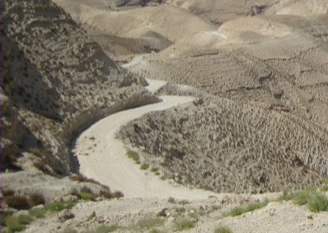The 26km journey from Jerusalem to Jericho involves a descent of some 3365ft – Jerusalem being 2540ft above sea level and Jericho 825ft below. At the time of Jesus, many of the Priests and Levites who served in the capital had their homes at its end. The uniquely low altitude town of Jericho, where Zacchaeus also lived, had only one major downside – the road there from Jerusalem was so dangerous that it had come to have the nickname of ‘the road of blood’.
This famous scenario that Jesus paints in his parable of the Good Samaritan in Luke 10:25-37, therefore, was readily imagined in the minds of his hearers.
As we learned during our trip, the genius of Jesus’ parable is revealed in its details. As this man goes down from Jerusalem to Jericho, he is robbed, beaten, stripped. He’s naked. The phrase we translate into English as ‘half-dead’ means that he is also unconscious by the side of the road.
Why was this so significant?
First century society was highly structured, and very often people could be identified by the way they were dressed, or the way that they spoke. Clothing was localised. So, too, was language. Priests, for example, usually spoke Hebrew. Ordinary folks usually spoke Aramaic, especially in the south. Up north, in Galilee, they spoke a dialect of Greek. Roman government officials all spoke Latin.
So, the fact that this man who had been attacked, was naked and unconscious meant that those who came across him would not have had any of the usual cultural signs to who he was, or where he was from. The fact that the Priest and Levite were also going down the road also removes from their stories any urgent requirement for their presence at the Temple.
What the three, in Jesus’ parable, found on the road that day, was simply a man. Their decisions on whether or not to help him were not determined by any racial, cultural or religious assessment, or by any pressing loyalties to duty.
Jesus’ point is, thus, clearly made. Our neighbour is simply whoever is in need – whatever their background, tradition or social status. The world’s, and our culture’s, divisions can be what they may. But, as Jesus’ disciples, as those who have been unbelievably, and undeservedly, loved by God, we do not pass by anyone, no matter how good our excuses may seem. Our calling is to the compassion of the Samaritan, and, in so doing, to point those around us to this life changing love that is offered across every divide.



